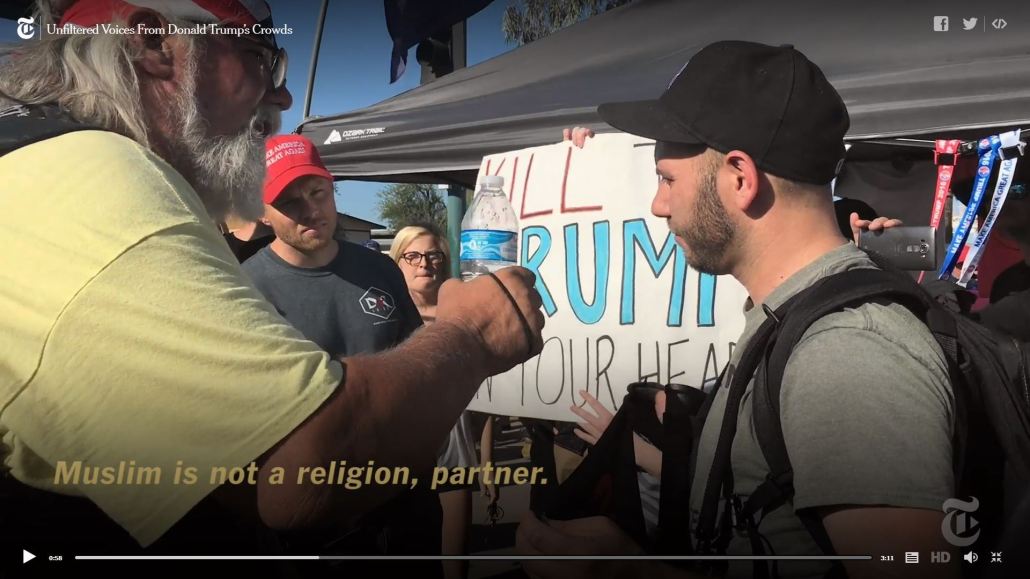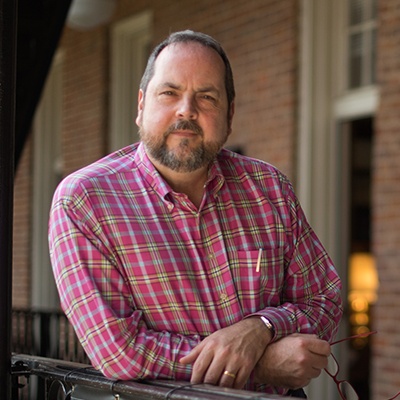A response to “Empty Signs in an automatic signalling system” with Timothy Fiztgerald & David G. Robertson by Russell McCutcheon.
“So what do you find most alarming about this move to redefine Islam as something other than a religion?”
So asked Benjamin Marcus, in his recent Religious Studies Project interview with Asma Uddin, on her then new book, When Islam Is Not a Religion. This question stood out for me as I listened because of the ease with which Islam seemed to be understood as self-evidently being a religion, a position from which it is no doubt “alarming” to see a movement developing within some segments of the U.S. that’s intent on reclassifying it as something other than a religion. Apart from the cases documented in Uddin’s book (such as the concerted, but eventually unsuccessful, effort to block the building of a new Islamic center in the city of Murfreesboro, Tennessee, a decade ago), I think of the “unfiltered video” from then candidate Donald Trump’s 2016 campaign that was posted by the New York Times, on August 3, 2016, which I’ve often used in classes. A dispute outside one of the events, between, on the one hand, a couple of Trump supporters—one of whom, yes, was wearing the red “Make American Great Again” cap—and, on the other, one of his detractors, resulted in the Trump critic being told in no uncertain terms that “Muslim is not a religion, partner, it’s an ideology,” followed by: “You don’t come and talk about America when you’re supporting Muslims” (see the 00.54 point of the video).
Above, Trump supporters and critic clash at a 2016 rally.
The question is whether this is “alarming.”
To answer that question, it strikes me that we first have to determine which voice speaks (i.e., we should ask: alarming to whom?), for in my own daily life, I occupy a number of different subject positions, one of which happens to be scholar of religion (more specifically, one who has long had interests that complement many of Tim Fitzgerald’s, as we’ve heard them described in his own RSP conversation with David Robertson). Should that be the voice that replies—and, as I would further argue, that’s the voice that should prevail in professional venues in our discipline—then it would do so knowing that when Weltreligionen was first developed in the mid- to late-nineteenth century, only Christianity and Buddhism counted to those German theologians as world religions, while all the rest that they knew of back then (and which our modern world religions textbooks today would certainly take for granted as requiring detailed chapters of their own) were classed merely as Landesreligionen, or what one might today somewhat awkwardly term national or even ethnic religions. Now, those much earlier, colonial-era scholars’ interests in distinguishing religions based on which had spread beyond what was then considered to be each of their original regions or kin groups are certainly not our own today; hence the disappearance of this particular binary. And scholars today certainly don’t share the even older understanding, despite once being widespread across Europe, that would not have even used this term “religion” to make sense of one’s place in the world but which, instead, would have simply distinguished Christendom (understood more as a civilization and geographic domain rather than a so-called belief system or faith tradition) from pagans and heathens (i.e., those once seen to be living out there in what some of us now would just call “the sticks”). But, despite being obvious classificatory relics, both episodes nicely illustrate that classification systems attend situated social interests and have practical effect—a principle that, I’d argue, applies no less to arguing whether something today is or is not a religion.
Now, should one be a student of such taxonomic systems, interested in how they work, who uses them, to just what effect, etc., then hearing “Muslim is not a religion, partner, it’s an ideology” spoken outside a 2016 Trump campaign rally is not so much alarming but, instead, makes an awful lot of sense—especially if we’re acquainted with not only the presence of long-simmering animosities and the current political divide in the U.S. but also with the manner in which marginal or recently migrated groups are effectively being scapegoated, as well as with the privileges that liberal democracies generally afford those things that are officially designated as religions (along with the inevitable policing that accompanies that designation); for in this discrete classificatory dispute just outside a campaign rally, we see a much larger, even geo-political social contest playing out, one that aims to call into question the rights of certain citizens (those identified as Muslims), rights to which they are properly entitled should Islam be understood as a religion.
In keeping with the work that some of us have been doing for the past couple of academic generations, with Fitzgerald’s writings featuring prominently in that group, the scholarly issue, then, is not whether Islam (let alone any other group) is really a religion, and it is certainly not whether the position of those Trump supporters was wrong or alarming; instead, it’s whether we can better understand why anything might, or might not, be called religion in the first place (let alone a world religion, a faith tradition, spirituality, etc.) in this or that specific situation, by this or that specific person, all in an effort to help us examine the social, political, economic, etc., effects of this designation when it is lodged in laws and Constitutions. So my guess is that scholars such as Fitzgerald, inasmuch as they speak and write as scholars of religion, would not find such claims all that alarming. Instead, such scholars would more than likely hear them in the context of the sort of a socio-political contestation that has been playing out for several centuries across Europe and, due to the success of European expansionism and colonialism, throughout the rest of the world as well, a contest that, in part, takes place by means of designating (or not) people, things, and institutions as religious.
I compare Fitzgerald’s RSP interview to Uddin’s for a reason, of course, for I think that we see here a longstanding rift in the field. Because the latter’s book is written from the point of view of, as she describes it, one who is “entrenched in both … the experience of Islam as a religious truth, and the legal and philosophical appreciation of religious liberty as inherent to human beings” (64), it understandably focuses on how to work within a classification system, such as the legal effort to determine what ought to be designated as a religion (and what ought not, such as Pastafarianism, at least in the opinion of some courts, not to mention those who, as Uddin phrases it, “hijack religious liberty to get away with criminal behavior” [125]). Although written for a popular audience, in this regard her book shares much with many recent scholarly works on religion and law—works which, in my reading, are often concerned with how social democracies can better accommodate religious expressions. But for those scholars who are, instead, interested in the very existence of such classification systems, and thus for those interested in, say, the socio-political work being done by discourses on experience along with discourses on religious freedom, not to mention the rhetoric of hijacking something (a focus of this forthcoming book), Uddin’s book and the RSP interview on it, along with the normative reaction of those currently trying to persuade their peers that Islam is something other than a religion, all constitutes data points in an ongoing contest deserving analysis. For while one may personally prefer to live in a world in which certain groups are understood in a way that privileges their members (freeing their meeting places from paying property tax, for example), that does not strike me as preventing scholars from being far more curious about why such things as a so-called religious exemption exists in the first place, about the larger systems that require these exemptions to exist, and about the strategic advantage that some may see to undermining others’ routine access to it. Such a scholarly voice would likely have little interest in normalizing these systems by merely operating within them, applying them, etc., but, rather, would probably seek to historicize the system itself, along with studying both its articulate users (such as the politicians who created, and lawyers trained to apply, such things as the U.S.’s Religious Freedom Restoration Act [1993]) and its vocal detractors (e.g., that man outside the rally). Fitzgerald and a small group of others, I contend, comprise this latter category.
And it is the size of this group that, I think matters, for despite about thirty years of continued work on these topics, those I once termed critics in the study of religion are still a rather marginalized group in the field. Case in point, recently I read someone characterizing such scholars as interested in mere words as opposed to doing real, empirical research—the sort of comment I fielded at the very start of my own career from what were then rather condescending senior scholars. Now, this seeming lack of effect shouldn’t be read as a statement about the insufficient nature of the critical work that’s being done but, instead, provides an insight into just how entrenched this dominant discourse actually is; for, as I recently observed in a paper that I presented to the 2019 annual meeting of the North American Association for the Study of Religion, despite all of us having apparently read our Edward Said and his critique of the work being done by our casual use of the East/West distinction, there’s no shortage of contemporary scholarship and courses in our field on “Eastern religion” let alone plenty of criticisms in the literature of how “the West” has done this or that historically. Old habits die hard because they are situated within larger contexts that organize our sense of who we are in relation to others, making both the East/West binary—despite Said’s best efforts to persuade readers that they were actually co-constitutive and socially formative tropes with no necessary relationship to things on the ground or in the bone, so to speak—as well as the discourses on religion, on religious experiences, on faith, etc., things that many scholars seem to have no choice but to continue to see as self-evident in their meaning and application. I concluded in that NAASR paper that critics would be wise to assume the continued and widespread use of these terms by their scholarly peers and the public alike, despite the growing critical work offered by some of us, given the crucial socially formative role such rhetorics still play in our lives and the way we organize ourselves into groups. But this doesn’t mean, of course, that such critical work has no effect, is a pointless pursuit, or is all about mere words.



